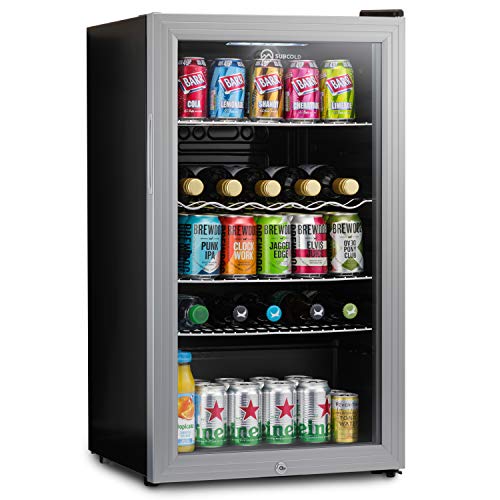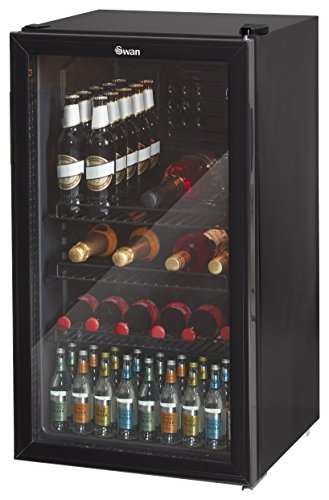14 Savvy Ways To Spend The Leftover Wine Cooler Budget
페이지 정보
작성자 Buck 작성일 24-12-30 17:31 조회 3 댓글 0본문
 What Is a Wine Cooler?
What Is a Wine Cooler?Wine coolers are an excellent device to keep your favourite wine at the right temperature. They also minimize the amount of vibrations that can influence the aging and preservation process.
Look for features that align with your collection's current and future requirements. Take into consideration the capacity of the bottle so that you can store enough bottles.
Bottle capacity
 A cooler is the ideal option if you plan to keep wine for a long time. These units are designed to hold large volumes of bottles at the correct serving temperature. However they are not designed to be used for optimal aging. They will ensure that your wine is at a safe temperature, and prevent unwanted vibrations which could cause the sediment to rise.
A cooler is the ideal option if you plan to keep wine for a long time. These units are designed to hold large volumes of bottles at the correct serving temperature. However they are not designed to be used for optimal aging. They will ensure that your wine is at a safe temperature, and prevent unwanted vibrations which could cause the sediment to rise.Different varieties of wine require a specific storage space. For instance, if you store your wine at temperatures that are too hot, it could develop a unpleasant cooked flavor and storing it in conditions that are too cold can cause the cork to freeze and damage the bottle. A wine cooler is a great solution for these conditions because it shields your wine fridge integrated from sun, heat, and humidity.
These appliances can also be installed into cabinets in your kitchen, or as a counter-top wine fridge to give your home a seamless and sleek appearance. Additionally, they can be energy efficient since they consume less power than compressor-based refrigerators. Thermoelectric fridges use the Peltier Effect that is a phenomenon involving the transfer of heat across two electrical junctions. In the end, these devices use less power than compressor-based wine fridges, and can be used in small areas.
These units can be used to store not just wine, but also beer and other alcoholic drinks. It is crucial to be aware of the dimensions of these bottles ahead of time so that you can select wine storage that fits them. You should also think about the shape of the bottles you prefer. Some bottles are cylindrical in shape while others are oval or rectangular.
Control of temperature
A wine cooler is a fridge which keeps wine at the ideal temperature. This allows for the preservation of the wine's natural flavor and aroma. The cooling system in a wine fridge can be either compressor-based or thermoelectric. Certain models come with humidity control features to maintain the right amount of moisture in the wine cellar. This helps prevent corks from drying out and the wine from becoming oxidized. Some undercounter wine refrigerator refrigerators use a fan to distribute air evenly and provide consistent temperatures throughout the cabinet.
Some wine coolers feature an analog or digital display that shows the temperature inside the fridge. However, the temperature displayed can differ from the actual temperature of the wine due to a number of factors, including air circulation, compressor noise, and vortices created when the door is opened. The evaporator coils can be frosted if they're not defrosted frequently. If you notice a frozen-over coil for your evaporator, you can test the thermistor and heater for continuity by using a multimeter.
The ideal temperature for serving and storing wine is between 45 and 65 degrees. It is crucial to store the wine at a certain temperature as different varieties of wine require a certain amount of heat to preserve their colour and aroma. If you keep white wine at a high temperature, it will develop a sour taste that isn't palatable. Red wine will lose its rich aromas and flavors when stored at a low temperature.
A wine cooler isn't only for wine storage, it can also be used to store canned and bottles of beer, soda and other non-alcoholic beverages. It comes in various sizes and is built-in or freestanding.
Energy efficiency
Wine coolers are made to work with a specific level of humidity and temperature. This is important to preserve the flavors and aromas of your wine for years to come, without losing its quality. They also limit the exposure to vibrations and sunlight, which can impact the process of aging. Many wine coolers are Energy Star certified, meaning that they meet strict energy-saving standards.
The exact energy consumption of a wine refrigerator will vary depending on several variables, such as the temperature of the room, the usage and storage conditions. On average, wine coolers use 85 watts per hour, which is quite low in comparison to other home appliances. Wine coolers are a great option for those who wish to save money each month on their electric costs, and still enjoy the convenience and luxury of keeping their favourite bottles in top condition.
If your wine cooler is using compressor or thermoelectric technology will also affect its energy efficiency. The thermoelectric cooler makes use of electric current to create temperature variations between the inside and the outside of the refrigerator. The chilled air then flows through a fan. This kind of wine refrigerator typically requires a greater initial investment than compressor models, however it can also offer better energy efficiency in the long run.
To increase the efficiency of your wine refrigerator, ensure it is properly insulated and placed in a well-ventilated location away from direct sunlight and heat sources like stoves or radiators. Ensure that the cooler has enough space around it to allow air to circulate. If your wine cooler has coils at the back, be sure to clean them regularly with a brush or cloth to get rid of any dust.
UV protection
UV protection is a must for any wine cellar cooler. It shields wine bottles from damaging UV light that can cause premature ageing and alter the taste of the wine. A good wine fridge will have a dark hue on its glass doors or solid doors that block sunlight and UV radiations from entering the refrigerator.
UV radiation can also harm the polymers and dyes contained in the bottle, causing degradation. This could cause the corks to break and cause an oxidation process and loss of taste. UV radiation can also speed up the chemical reactions in a wine bottle and cause it to age more quickly and lose its aromas and flavours. Wine coolers are a great option, as they provide superior UV protection that is ideal to preserve your wine and safeguarding your investment.
The right wine cooler for you depends on the location you choose and your needs for storage of your wine. Wine coolers maintain your wines at 55 degrees F. This is the ideal temperature for wine fridge sale storage. They also regulate humidity levels to avoid moisture that can cause mildew and mold. A good wine cooler also avoids unwanted vibrations that can disturb the sediment in older bottles and alter their taste.
The best wine storage fridge wine refrigerators also come with display shelves that allow you to showcase your most loved and oldest bottles of wine. They also have charcoal filters that remove the smell of inbuilt wine fridge - please click the following post -, and also have an automated humidity control. Many wine coolers come with alarms that warn you if the door is opened.
Vibration reduction
A wine cooler is an appliance that keeps bottles of wine at a temperature that is perfect for aging or drinking. Some models have advanced features that improve the storage experience. These include UV protection, vibration control and humidity control. These features will ensure that your wine develops its full flavour and character over time.
Vibration reduction is a crucial feature for wine coolers because excessive movement could disturb the sediment and interfere with aging. Research has shown that vibrations can also affect the flavor and aroma of wines, by reducing their propanol and isoamyl alcohol levels [55. It is therefore important to keep your wine cooler away from other appliances that have moving parts, such as washers and tumble dryers.
Wine Coolers equipped with vibration reduction technology employ an absorption system to cut down on noise and vibrations. One part of the Peltier module absorbs heat inside the refrigerator, while the other side releases it to the surrounding environment. This process reduces the noise and vibration generated by the compressor-based wine cooler.
Certain wine coolers can be noisy particularly during initial usage or the startup. This can be disruptive to your daily life, so it is important to think about the noise level when purchasing a wine fridge. To minimize disruptions, look for wine coolers that have low levels of noise, less than 40 decibels.
When choosing a wine refrigerator, it is important to be aware of the energy efficiency. A lot of the latest models are constructed with environmentally friendly insulation improvements and low-energy compressors to conserve energy. This feature can help cut your electricity consumption by up to 50%, saving you money in the long run.
- 이전글 In which countries are free live cams legal?
- 다음글 Why You Should Focus On Enhancing Cryptocurrency Online Casino
댓글목록 0
등록된 댓글이 없습니다.
